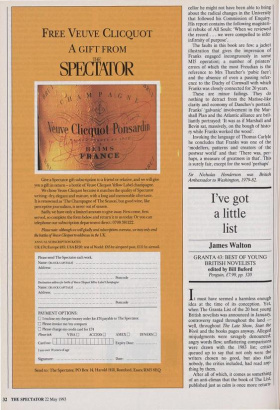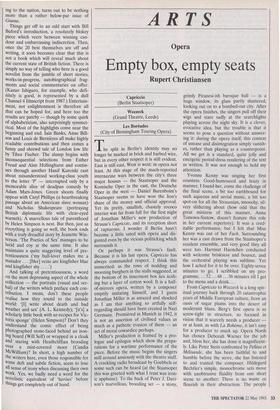I've got a little list
James Walton
GRANTA 43: BEST OF YOUNG BRITISH NOVELISTS edited by Bill Buford Penguin, £7.99, pp. 320 It must have seemed a harmless enough idea at the time of its conception. Yet, when The Granta List of the 20 best young British novelists was announced in January, controversy raged throughout the land well, throughout The Late Show, Start the Week and the books pages anyway. Alleged misjudgments were savagely denounced; angry words flew; unflattering comparisons were drawn with the 1983 list; critics queued up to say that not only were the writers chosen no good, but also that nobody, the critics included, had read any- thing by them.
After all of which, it comes as something of an anti-climax that the book of The List, published just as calm is once more return-
ing to the nation, turns out to be nothing more than a rather below-par issue of Granta.
Things get off to an odd start with Bill Buford's introduction, a resolutely blokey piece which veers between winning can- dour and embarrassing indiscretion. Then, once the 20 best themselves are off and writing, it soon becomes clear that this is not a book which will reveal much about the current state of British fiction. There is simply no way of telling who here is a good novelist from the jumble of short stories, works-in-progress, autobiographical frag- ments and social commentaries on offer. (Kazuo Ishiguro, for example, who defi- nitely is good, is represented by a dull Channel 4 filmscript from 1987.) Entertain- ment, not enlightenment is therefore all that can be hoped for, and here too the results are patchy — though by some quirk of alphabeticism, also surprisingly symmet- rical. Most of the highlights come near the beginning and end. fain Banks, Anne Bill- son and Louis de Bernieres all make highly readable contributions and then comes a funny and shrewd tale of London low life by Tibor Fischer. The slump begins with inconsequential selections from Esther Freud and Alan Hollinghurst and contin- ues through another Hanif Kureishi rant about misunderstood working-class youth to the letter 'P' — interrupted only by a memorable slice of deadpan comedy by Adam Mars-Jones. Green shoots finally appear with Caryl Phillips (a heartbreaking passage about an American slave woman) and Nicholas Shakespeare (portraying British diplomatic life with clear-eyed warmth). A marvellous tale of parenthood by Helen Simpson is next. But then, just as everything is going so well, the book ends with a truly dreadful story by Jeanette Win- terson. 'The Poetics of Sex' manages to be lurid and coy at the same time. It also maintains a quite staggering level of pre- tentiousness (`my bull-lover makes me a matador . . . [Her] veins are kingfisher blue and kingfisher shy . . ..')
And talking of pretentiousness, a word on the most depressing aspect of the whole collection — the portraits (visual and ver- bal) of the writers which preface each con- tribution. I mean, don't these people realise how they sound to the outside world: `[I] write about death and bad weather and sex' (A. L. Kennedy); `[it's] a scholarly little book with ur-recipes for Vic- toria sponge' (Helen Simpson)? Don't they understand the comic effect of being photographed stone-faced behind an iron- ing board (Will Self) or wrapped in a cloak and staring with Heathcliffian brooding over a mist-covered moor (Candia McWilliam)? In short, a high number of the writers here, even those responsible for some deft and subtle fiction, seem to lose all sense of irony when discussing their own Work. Yes, we badly need a word for the novelistic equivalent of luwies' before things get completely out of hand.



















































 Previous page
Previous page